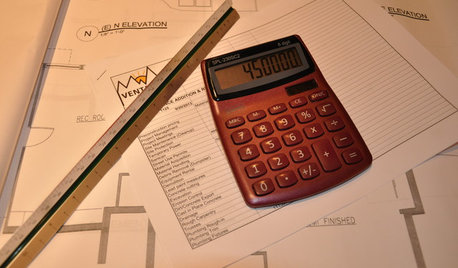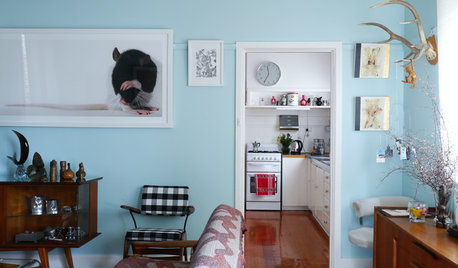Priceless psychology- pricing your home
marvelousmarvin
10 years ago
Related Stories

COLORColor Magic: Tap Into Psychology to Better Use Blue at Home
OK, it's backed more by science than magic. But see how expert research can help you create powerful, even bewitching, interior effects
Full Story
ARTLet's Put a Price on Art: Your Guide to Art Costs and Buying
We paint you a picture of what affects an artwork's price — plus a little-known way to take home what you love when it's beyond your budget
Full Story
MOST POPULARWhy We Love Midcentury Modern Design
There's a method to all this 'Mad Men'-ness — just look to psychology, tough times and, believe it or not, Apple
Full Story
BUDGET DECORATINGSimple Pleasures: Treat Yourself to Cut Flowers
Enjoy priceless beauty with just a few inexpensive stems — and you don’t need fancy vases, either
Full Story
MAN SPACESWhy Men Really Do Need a Cave
Don't dismiss cars, bars and the kegerator — a man space of some kind is important for emotional well-being at home
Full Story
CONTRACTOR TIPSLearn the Lingo of Construction Project Costs
Estimates, bids, ballparks. Know the options and how they’re calculated to get the most accurate project price possible
Full Story
REMODELING GUIDESContractor Tips: 10 Hats Your General Contractor Wears
Therapist, financial advisor, mediator — for the price of a single good contractor on your remodel, you're actually getting 10 jobs done
Full Story
DIY PROJECTSHow to Create Your Own Semicustom Media Wall
Don’t let the price of a custom built-in stop you. Put one together with ready-made pieces and a little finish help
Full Story
VINTAGE STYLEMy Houzz: A Fresh Start in a Welcoming 1950s Home
Family and friends help a Melbourne homeowner create a comfortable space that beautifully reflects her personality
Full Story
HOME TECHWhy Your Home Office Should Be in the Backyard
Superman needs a fortress of solitude. And so do you
Full Story







marvelousmarvinOriginal Author
otterkill
Related Professionals
Baton Rouge Architects & Building Designers · Euless Architects & Building Designers · Providence Architects & Building Designers · Ames General Contractors · Dorchester Center General Contractors · Galveston General Contractors · Grand Junction General Contractors · Hammond General Contractors · Mount Vernon General Contractors · Murrysville General Contractors · Waianae General Contractors · Winton General Contractors · Richfield Home Stagers · Fountain Hills Interior Designers & Decorators · New Providence Interior Designers & Decoratorsncrealestateguy
hayden2
lazy_gardens
robo (z6a)
sas95
palimpsest
Mmmbeeer
Mmmbeeer
weedyacres
Mmmbeeer
mpagmom (SW Ohio)
debrak2008
nosoccermom
mpagmom (SW Ohio)
nosoccermom
marvelousmarvinOriginal Author
User
azmom